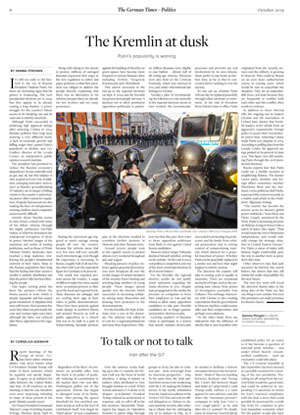To cut the Gordian Knot in Eastern Ukraine, Volodymyr Zelensky will have to skirt accusations of treason while convincing the Kremlin to change its course
May 20, 2019, saw the inauguration of Ukraine’s sixth president, Volodymyr Zelensky. Despite his convincing results at the polls, the young politician polarizes Ukrainians like no one else can. The split for and against Zelensky cut right through the heart of Ukrainian society. His supporters and critics have pinned various hopes and concerns on their new head of state: fighting corruption vs. continuing the system of oligarchs, improving living standards vs. a further deterioration in living standards, efficient reforms vs. gridlock.
Vladimir Putin did not call to congratulate Zelensky on his election, and there is no praise for the Ukrainian president on Russian TV. Still, Zelensky is obviously taking advantage of some sort of channel to the Kremlin, as demonstrated by the recent exchange of prisoners between the two countries in September.
The central question still facing Ukrainian politics – and the issue that motivated many Ukrainians to vote either for or against the political newcomer – continues to be whether Zelensky can succeed in bringing a lasting peace to Eastern Ukraine, and if so, at what price.
Immediately after the race for Mariyinsky Palace began, Zelensky was prioritizing a peaceful solution to the Donbass conflict, although he was tight-lipped on details of his peace plan in the few election interviews he gave. Zelensky’s concept only started to take shape between the two rounds of elections in April 2019. His plan involved putting an end to the fighting, addressing the needs of the population in the regions not controlled by Kiev on a massive scale, resuming pension payments to “our compatriots,” whom he sees as “victims of a propaganda war,” and direct negotiations with Vladimir Putin. He also proposed greater involvement of Western countries in the reconciliation process.
Zelensky, however, has categorically rejected making any concessions to Russia. In his inauguration speech, which was partly given in Russian, the new head of state was blunt: “We didn’t start this war. But we have to end this war.” Critics have accused Zelensky of making unrealistic proposals, as any direct negotiations with the Ukrainian side beyond the Normandy format would put Moscow in a position in which it would have to admit to its role in the conflict. For its part, the Kremlin regards the fighting in Eastern Ukraine as a civil war.
During his first 100 days in office, Zelensky demonstrated adequate toughness in dealing with Russia, even if his strategy comprised mainly verbal comments. He called on participants in the Normandy format to start negotiations as quickly as possible, while also regularly attacking Russian activities in Donbass and the annexation of Crimea.
As expected, two telephone calls between Zelensky and Putin brought no decisive breakthrough. In other words, the new Ukrainian head of state has very little practical success to show for himself thus far.
In early summer, the Normandy contact group (Ukraine, Russia and the OSCE) agreed on a path to a ceasefire, and at the end of June, troops successfully stood down at Stanytsia Luhanska.
In other combat sectors, however, the exchange of fire is still part of everyday life. Thirty-one Ukrainian soldiers have died in Donbass since the new president took office.
Other steps considered by those in Zelensky’s circle – such as lifting the economic blockade and re-connecting the drinking water supply in the separatist regions in an effort to build confidence – continue to exist solely on paper. First of all, Putin has also demanded an end to restrictions on the movement of goods in Eastern Ukraine, but Zelensky can ill afford to do Putin’s bidding.
Secondly, the young president must weigh his political power; he is thus seeking to avoid conflict with Ukraine’s elite, who do not look favorably on contact with pro- Russian separatists.
For this reason, former president Leonid Kuchma, who now represents Ukraine in the contact group, made any lifting of the blockade contingent on several conditions, such as the return of captured Ukrainian companies to their legal owners, including the state, which took the proposal to lift the blockade off the table.
Zelensky has found heads of state outside Russia to be willing to listen to him. He has visited Germany, France, Turkey and EU and NATO headquarters in Brussels, with the most positive feedback coming from Emmanuel Macron. The French president spoke of a “real opportunity” for change after Zelensky’s inauguration and has expressed a wish for reviving the Normandy format against Putin.
Kiev could regain control over separatist areas in Eastern Ukraine within 10 to 12 months. The roadmap for doing so is not new and is set out in the Minsk Protocol. The biggest obstacles remain the municipal elections, which would have to take place in all the regions under Ukrainian law, and the stationing of Ukrainian border guards at the Donetsk and Luhansk sections of the Russian-Ukrainian border. This would mean the end of the separatists’ rule.
Another bone of contention is the duration of special status for the above-mentioned regions. The Ukrainian government would agree to a transition period of five years, whereas Russia has called for an unlimited period. The exact role of places such as Vuhlehirsk and Debaltseve in this future special administrative area will then have to be defined. This Gordian Knot will be extremely difficult to cut.
The West should not only support Zelensky personally, it should also back Ukraine as country, even though it knows these moves will not have a decisive impact. Indeed, the key to a peaceful resolution of the conflict lies in Moscow.
Zelensky has been charged with a task akin to squaring the circle, that is, of getting the Kremlin to change its course without being accused of treason at home. At the moment, there is no possible solution that will be acceptable to all parties. Although prisoner swaps have a wide media impact, they are small steps on the path to freedom in Donbass. Any successful re-integration of separatist areas into the Ukrainian Federation would be a compromise, and every compromise has its political price.
Dmitri Stratievski
is deputy chairman of the Osteuropa Zentrum Berlin.




